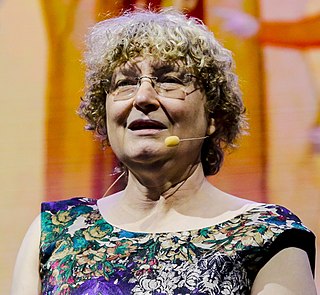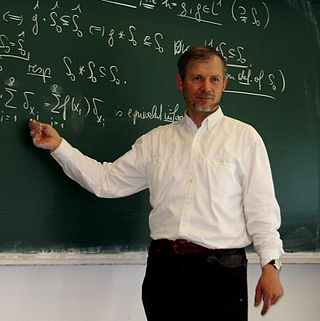Digital signal processing (DSP) is the use of digital processing, such as by computers or more specialized digital signal processors, to perform a wide variety of signal processing operations. The digital signals processed in this manner are a sequence of numbers that represent samples of a continuous variable in a domain such as time, space, or frequency. In digital electronics, a digital signal is represented as a pulse train, which is typically generated by the switching of a transistor.

Stéphane Georges Mallat is a French applied mathematician, concurrently appointed as Professor at Collège de France and École normale supérieure. He made fundamental contributions to the development of wavelet theory in the late 1980s and early 1990s. He has additionally done work in applied mathematics, signal processing, music synthesis and image segmentation.

Baroness Ingrid Daubechies is a Belgian-American physicist and mathematician. She is best known for her work with wavelets in image compression.
Ali Naci Akansu is a Turkish-American professor of electrical & computer engineering and scientist in applied mathematics.

Robert Jackson Marks II is an American electrical engineer, computer scientist and Distinguished Professor at Baylor University. His contributions include the Zhao-Atlas-Marks (ZAM) time-frequency distribution in the field of signal processing, the Cheung–Marks theorem in Shannon sampling theory and the Papoulis-Marks-Cheung (PMC) approach in multidimensional sampling. He was instrumental in the defining of the field of computational intelligence and co-edited the first book using computational intelligence in the title. A Christian and an old earth creationist, he is a subject of the 2008 pro-intelligent design motion picture, Expelled: No Intelligence Allowed.
John Joseph Benedetto is a professor of Mathematics at the University of Maryland, College Park and is a leading researcher in wavelet analysis and Director of the Norbert Wiener Center for Harmonic Analysis and Applications. He was named Distinguished Scholar-Teacher by the University of Maryland in 1999 and has directed 63 Ph.D. students. The volume Harmonic Analysis and Applications: In Honor of John Benedetto, edited by Christopher Heil, describes his influence:
John J. Benedetto has had a profound influence not only on the direction of harmonic analysis and its applications, but also on the entire community of people involved in the field.

Abdul Jabbar Hassoon Jerri is an Iraqi American mathematician, most recognized for his contributions to Shannon Sampling Theory, Its Generalizations, Error Analysis, and Historical Reviews, and in particular his establishment in 2002 of the journal Sampling Theory in Signal and Image Processing with over thirty top international experts as its editors, besides establishing its Sampling Publishing, also his contribution to the general understanding of the Gibbs Phenomenon, where he wrote the first book ever on the subject, published by Springer - Verlag, then he followed it by editing another book on Advances in Gibbs Phenomenon published by Sampling Publishing.
Fedor (Fedya) L'vovich Nazarov is a Russian mathematician working in the United States. He has done research in mathematical analysis and its applications, in particular in functional analysis and classical analysis.

Emmanuel Jean Candès is a French statistician most well known for his contributions to the field of compressed sensing and statistical hypothesis testing. He is a professor of statistics and electrical engineering at Stanford University, where he is also the Barnum-Simons Chair in Mathematics and Statistics. Candès is a 2017 MacArthur Fellow.

Sergio Albeverio is a Swiss mathematician and mathematical physicist working in numerous fields of mathematics and its applications. In particular he is known for his work in probability theory, analysis, mathematical physics, and in the areas algebra, geometry, number theory, as well as in applications, from natural to social-economic sciences.

Hans Georg Feichtinger is an Austrian mathematician. He is Professor in the mathematical faculty of the University of Vienna. He is editor-in-chief of the Journal of Fourier Analysis and Applications (JFAA) and associate editor to several other journals. He is one of the founders and head of the Numerical Harmonic Analysis Group (NuHAG) at University of Vienna. Today Feichtinger's main field of research is harmonic analysis with a focus on time-frequency analysis.
Assaf Naor is an Israeli American and Czech mathematician, computer scientist, and a professor of mathematics at Princeton University.
Irena Lasiecka is a Polish-American mathematician, a Distinguished University Professor of mathematics and chair of the mathematics department at the University of Memphis. She is also co-editor-in-chief of two academic journals, Applied Mathematics & Optimization and Evolution Equations & Control Theory.

Foundations of Computational Mathematics (FoCM) is an international nonprofit organization that supports and promotes research at the interface of mathematics and computation. It fosters interaction among mathematics, computer science, and other areas of computational science through conferences, events and publications.
Deanna Needell is an American applied mathematician at the University of California, Los Angeles. She has authored over 200 research papers, graduated many PhD students and mentored a large number of postdocs. She is known for work on machine learning, optimization, and signal processing as well as applications involving community nonprofits in medicine and social justice.
Akram Aldroubi is an American mathematician known for his work in sampling theory, harmonic analysis, and their applications to signal and image processing as well as biomedical data analysis.
María Cristina Pereyra is a Venezuelan mathematician. She is a professor of mathematics and statistics at the University of New Mexico, and the author of several books on wavelets and harmonic analysis. Pereyra was an American Mathematical Society (AMS) Council member at large from 2019 - 2021.

Gitta Kutyniok is a German applied mathematician known for her research in harmonic analysis, deep learning, compressed sensing, and image processing. She has a Bavarian AI Chair for "Mathematical Foundations of Artificial Intelligence" in the institute of mathematics at the Ludwig Maximilian University of Munich.
Zhi-Quan (Tom) Luo is Vice President (Academic) of The Chinese University of Hong Kong, Shenzhen, Director of Shenzhen Research Institute of Big Data and Director of CUHK(SZ)-Tencent AI Lab Joint Laboratory on Machine Intelligence.
Maamar Bettayeb is a control theorist, educator and inventor. He is the author of publications on understanding the singular value decomposition and model order reduction. Bettayeb is also a promoter of scientific research.








